
Related
Topics
Guests
- Barry Landoauthor of Web of Deceit: The History of Western Complicity in Iraq, from Churchill to Kennedy to George W. Bush. He is a former investigative producer for CBS 60 Minutes. He runs a blog at BarryLando.com.
Barry Lando, a former 60 Minutes producer, examines how the United States has meddled in Iraq dating back to the Eisenhower administration. He also looks at how the Reagan and Bush administration helped arm Saddam Hussein at a time when he was committing his deadliest atrocities. [includes rush transcript]
Transcript
AMY GOODMAN: One month has passed since the execution of Saddam Hussein. The Iraqi dictator was hanged for ordering the killing of 148 Shiite villagers in 1982. His death drew a mixed response: in Iraq, widely celebrated by Shias and Kurds, while condemned by the Sunni community he came from; around the world, British Prime Minister Tony Blair was among those to applaud Hussein’s death but to condemn the way he was executed.
Less vocal—or heard—were those critics who said Saddam was executed before he could stand trial for his worst atrocities. A just trial, these critics say, would have also charged or subpoenaed many of the world leaders, arms merchants and oil companies that supported him. Well, today we look at the trial that could have been.
My next guest is author of Web of Deceit: The History of Western Complicity in Iraq, from Churchill to Kennedy to George W. Bush. Barry Lando is a veteran journalist. He spent 25 years as an award-winning investigative producer for 60 Minutes. He joins us here in the firehouse studio. Who do you think should have been tried alongside Saddam Hussein?
BARRY LANDO: Well, depending on what crimes we’re talking about. There’s all kinds of crimes that he committed during his reign. But if we start with the trial that is actually still going on now, though I think many of us have forgotten that although Saddam is not there, the trials continue in Baghdad.
AMY GOODMAN: Explain how that is happening without him.
BARRY LANDO: Well, because he wasn’t the only one guilty. In other words, his commanders, military commanders, other people who worked with him in Iraq, his confederates, were also — he didn’t commit these crimes single-handedly, as Hitler didn’t either. So, although Hitler wasn’t there, the Nuremberg trials proceeded, and other people were judged and hung after those trials. The same thing is going on in Baghdad today.
And the trial that is going on right now is for the genocidal attacks against the Kurds in Iraq in the late 1980s by Saddam and his military commanders. And what is forgotten, though, is the complicity of the United States, and if we’re dealing with chemical weapons, it’s also the case some American and basically European companies, in supplying some of the weapons to Saddam. When the genocidal attacks began in the late 1980s — and one of the most notorious was the attack in the village of Halabja, when chemical weapons were used in — I think it was in March 1988 — when that happened, the United States turned its back on those crimes. They tried to pretend that they hadn’t happened. The U.S. Congress wanted to condemn Saddam for using chemical weapons, and the Reagan and then the Bush administrations attempted to protect Saddam to prevent the Congress from initiating sanctions against him.
AMY GOODMAN: Didn’t senators at that time, including Robert Dole, go meet with Saddam Hussein?
BARRY LANDO: Right. Senators from the agricultural states went to meet with Saddam, because the U.S. agricultural producers, rice farmers, wheat farmers, were supplying hundreds of millions of dollars’ worth of grain to Saddam, and they wanted that to continue.
AMY GOODMAN: This was at a time when they understood that he had used chemical weapons.
BARRY LANDO: Absolutely. Right.
AMY GOODMAN: It’s interesting to note that on the floor of the Senate in the debate over the authorization of the current Iraq War, what happened in the late 1980s was raised hundreds of times. Yet, when it came to the Persian Gulf War that George Bush Sr. presided over, that was hardly used as a rationale, which was just a few years after what you’re describing, perhaps because of Saddam Hussein’s use of chemical weapons in the late 1980s, when we’re talking about the war of 1990, 1991 —
BARRY LANDO: Right, right.
AMY GOODMAN: — because, at the time, Bush and Reagan were a part of allowing that to happen and stopping the sanctions.
BARRY LANDO: Well, they wanted to continue relations with Saddam. They had reports about what a tyrant he was. But first Reagan and then Bush wanted to continue U.S. relations with Iraq. They saw Iraq as a fantastic market for the United States. It had the petroleum wealth it had to rebuild after the war with Iran, and they thought that the United States businesses, high-tech corporations, wheat farmers, rice farmers, all could take advantage of these fantastic opportunities. There were others in the administration, in the Bush administration, who were arguing, “No, this guy, he’s a bad actor, and we should have nothing to do with him.” But George Bush Sr. and James Baker pushed all along to keep good relations with Saddam and to have hundreds of millions of dollars of loans made to Saddam, so that he could continue to buy, purchase from the outside world, including very sophisticated weapons or material that could be used to construct weapons of mass destruction. There were Pentagon warnings that went to the Bush administration, saying the Iraqis are buying material from us that can be used for weapons of mass destruction, and Bush and Baker made sure that those sales continued to go through, despite those warnings.
AMY GOODMAN: We’re talking to Barry Lando. His book is Web of Deceit: The History of Western Complicity in Iraq, from Churchill to Kennedy to George W. Bush. We’ll be back with him in a minute.
[break]
AMY GOODMAN: We continue our conversation with Barry Lando. His book is called Web of Deceit: The History of Western Complicity in Iraq, from Churchill to Kennedy to George W. Bush. He is a former investigative producer for 60 Minutes on CBS and runs the blog BarryLando.com. You’re talking about the Bush/Reagan years. Let’s go back a little further, which actually brings us up to the present, because in 1983, 1984, there’s the two famous visits of Donald Rumsfeld, then the envoy for Reagan and Bush to Saddam Hussein, shaking his hands. Talk about what was known at that time and what he was doing there.
BARRY LANDO: Well, in 1983 the Iraqis were already using chemical weapons against Iranian troops. They were already at war with Iran. They had been at war with them for about three years. And the Iranians were using kind of mass formations of child warriors running at the Iraqi lines, and so they found chemical weapons were quite effective, the Iraqis did. And the U.S. knew this. And at the time, Iran asked for the United Nations to investigate the use of these illegal weapons. And the United States, I think England as well, helped block any attempt by the United Nations to investigate this. This is back in 1983. This is five years before they used it in Halabja.
And at the same time, Donald Rumsfeld was sent, as you say, by Ronald Reagan as a special envoy to talk with Saddam Hussein, because the U.S. didn’t have relations with Iraq at that point. They had cut them a few years earlier over the whole Israeli-Palestinian dispute, and that Saddam was apparently supporting terrorists, so the United States had cut diplomatic relations with Iraq. Rumsfeld went there to see if they could warm things up, because the United States wanted to help Iraq. They didn’t want Iran to win the war. Also they wanted Saddam’s help for political problems that they were having in Lebanon at the time.
So Rumsfeld went there, and he had a warning, a long briefing paper, from the State Department. One of the things concerned Saddam’s use of chemical weapons. Rumsfeld talked about that with Saddam’s foreign minister, Tariq Aziz, but when he met with Saddam over an hour, he talked about all kinds of other subjects, but he didn’t bring up the subject of chemical weapons at all.
And so, five or six years later, when Saddam used chemical weapons against the Kurds, when one of the Iraqis questioned one of the commanders who was going to use them, the man who became known as Chemical Ali, said, “The rest of the world? Who cares about the rest of the world if we use chemical weapons?” In other words, he already knew, in their experience with the Iranians, that the world would say nothing if they continued to use chemical weapons against their own people. And that, in fact, was the case.
AMY GOODMAN: And these are now the trials that are taking place today?
BARRY LANDO: Well, the trial that’s going on right now involves the genocide of the Kurds, which involved chemical weapons and mass executions, population — incredible forced movements of populations. You know, the U.S. did absolutely nothing when those were occurring.
AMY GOODMAN: So what was the rationale for executing him before he was fully tried.
BARRY LANDO: I don’t know what the actual rationale was. No one really explained. The first trial they put on, the Dujail trial, was for a relatively minor — I think 164-165 people who were killed after there had been an assassination attempt against Saddam. But it kind of got him out of the way to execute him afterwards. First of all, he remained a symbol for the Sunnis, so I think the Shiites wanted to get him out of the way. I don’t really feel it was to cover up foreign complicity in the other trials that are going to come. I think they just wanted Saddam out of the way. I think the way the tribunal has been set up from the beginning basically protects the United States and other countries from being accused.
AMY GOODMAN: How?
BARRY LANDO: Well, the tribunal has basically been set up by the United States. The U.S. finances the tribunal. It trained the judges. It trained the lawyers, the prosecutors. And there was also a special provision in the statute of the tribunal that the press seems to have ignored, and that is that only Iraqi citizens or Iraqi residents can be accused. In other words, foreigners cannot be brought before the tribunal.
AMY GOODMAN: We’re talking to Barry Lando, Web of Deceit: The History of Western Complicity in Iraq, from Churchill to Kennedy to George W. Bush. Whether it was the intent or not, once Saddam Hussein is taken out of the picture, there’s almost no international or at least U.S. press attention on these trials that are continuing, which means that complicity —
BARRY LANDO: Well, you know, that’s true, but except, I guess, because I’m obsessed by the subject, I’ve been following the press pretty closely. The New York Times, the Post, the Los Angeles Times, Associated Press are all continuing to cover these crimes, the trials that are going on, the ones against the Kurds right now. Later on this year, there will be another trial, too, for even more killings. What has amazed me is that the press, particularly the American press, has made not a mention of American complicity in these crimes. Frankly, I don’t understand why.
AMY GOODMAN: I want to go back in time, Barry Lando, because you start the history of Western complicity in Iraq from Churchill to Kennedy to George W. Bush. Talk about how Iraq was formed, the current modern state of Iraq, and the central role of oil.
BARRY LANDO: Well, it was formed out of the collapsing Ottoman Empire at the end of World War I. The British and the French went in to kind of divide up much of the Ottoman Empire. And the British took essentially what is Iraq today. It was three provinces of the Ottoman Empire, and they put them together around 1920, ’21, into one country, which became known as Iraq.
These were peoples who had lived under the Ottoman Empire, but they had never been put together into one state, sort of living side by side politically and administratively. And it was a recipe for disaster. The British were warned about it at the time, but the reason they wanted to put these people — the Shiites, the Sunnis, and particularly the Kurds — in one place is the British wanted the petroleum, particularly the petroleum that the Kurds had. Kurdistan is a major petroleum area. They suspected — they weren’t pumping petroleum at the time, but they knew that it was there, and the British wanted that.
And they also wanted bases, too, in that part of the world, to protect their Persia, which was an important part of the British Empire, and India. So bases there became very important for them, too. So you had two things: petroleum and military bases, which are basically exactly the same motives, I think, that are keeping the United States in that part of the world today.
AMY GOODMAN: How did the U.S. first get involved with Iraq?
BARRY LANDO: They came in as the British Empire was weakening, beginning to fall apart in the ’50s. The United States became active in that part of the world, and as the Cold War was going on, too, they looked at any attempts by leaders in that part of the world to become more independent from the West, to get more of their — take more of their own petroleum resources for the benefit of their own country. To seek any kind of outside help from the Soviets, that became a sign that these people had to go. You had Eisenhower, Dulles, the CIA went in and overthrew leaders in that part of the world at that time.
AMY GOODMAN: John F. Kennedy and the CIA in Iraq?
BARRY LANDO: Well, before Kennedy, you had Eisenhower and Dulles, too, the overthrow of Mossadegh in 1953 in Iran. Then you had John Kennedy. In 1963, you had a nationalist ruler in Iraq, Qasim, and Kennedy’s CIA and the Egyptians, who also didn’t like him, joined together and they helped organize a coup in Iraq that overthrew Qasim. The Baath Party, which was — Saddam Hussein was then a junior member of the Baath Party — came into power.
They were — the U.S. liked them at the time. They were secular, strongly anti-communist, anti-Soviet. So they were seen as allies by the CIA. When they took over in 1963, the CIA supplied them with lists of suspected communists, militants, left-wing intellectuals, professionals, to be taken care of. They were picked up, tortured, and many of them were killed. We’re talking about hundreds, maybe thousands, of people. Saddam Hussein then was one of the young torturers at that time.
AMY GOODMAN: And then, explain how he rose to power.
BARRY LANDO: Well, then, back in — the Baath fell out of power again in 1968. There was another coup, and they came back in, and Saddam became the power behind the throne. It took him 10 years to become formally head of Iraq, of the government in Iraq, but for most of that time he was already seen as the man behind the throne. He ran the secret police, and he used Stalinist methods to take over. He was a great admirer of Stalin. So in 1979, Saddam formally became the leader of Iraq.
AMY GOODMAN: President Carter’s role here?
BARRY LANDO: Well, at this time, Khomeini had come to power in Iran, after the Shah was overthrown. Khomeini came to power. He was seen as an enemy of the United States, which he was. And you had the hostages taken. American hostages were taken from the embassy in Iran. And so, Carter did anything — he wanted to do anything he could to weaken Khomeini. So did the other states of the Gulf. The Saudis, the Kuwaitis were terrified of Khomeini and what he could represent to their hold on that region, because Khomeini viewed them as dictators, and he was for the national — taking over the oil, petroleum resources of those countries, as well, not for himself, but for the people of those countries. He represented a major threat.
Jimmy Carter encouraged Saddam, via the Saudis, to invade Iran. That started a war, which lasted for eight years, longest war of the 20th century, resulted in at least a million people dying on both sides. And, of course, the United States, other Western countries, Soviets, sold arms, continued to support the Iraqis during that period, and when it looked, though, that the Iraqis might win — because they didn’t want either side to win, really — they also sold arms to the Iranians, as well. So the battle kind of went back and forth for eight years, with many countries selling arms to both sides. And the United States, in fact, even gave intelligence aid to both sides. And in the end, as I said, a million people died because of that war.
AMY GOODMAN: Gave intelligence on where Iranian soldiers were, to be gassed by Saddam Hussein.
BARRY LANDO: Exactly. The U.S. gave satellite information, more to the Iraqis, enabling them to target Iranian troop concentrations, even though the U.S. knew that the Iraqis were using chemical weapons.
AMY GOODMAN: Can you talk about the effect of the sanctions period, largely through President Clinton?
BARRY LANDO: Yeah, well, that started after Saddam had been thrown out of Kuwait. And you had — an uprising took place, that was a whole other story.
AMY GOODMAN: Well, speak briefly about that uprising, because it’s very significant for Iraqis’ view of the United States, too, and it involved President Bush Sr.
BARRY LANDO: Yeah. To me, the uprising and what happened is really key, in a way, to what’s going on there today. As Saddam had invaded Kuwait in August of 1990, and the United States moved in to push him out of Kuwait, when they did, George Bush called on the people of Iraq publicly, called on them to rise up and overthrow Saddam Hussein. This call was relayed by the CIA’s secret radio stations all over Iraq, and U.S. airplanes also dropped millions of pamphlets over Iraq, telling the people of Iraq to rise up and overthrow Saddam. And they did. And the uprising spread like wildfire across southern Iraq. These were among the Shiites. The Kurds also rose up.
Then, the U.S., Bush Sr. and James Baker, became worried, because they realized they weren’t going to be able to control this uprising. They had wanted a military coup, a nice, neat military coup that in the end they could really control. But what, in fact, happened was a popular revolt. They were worried that perhaps Iran would come in, would try to make use of it; that the Kurds would try to set up an independent country that would disturb Turkey, their allies; that the Saudis wouldn’t like what was going on there. And so, they turned their back on the uprising.
They allowed Saddam to continue using his helicopters to attack the villages, and the Shiites had no way of fighting back against these helicopters. And when the Shiites came to American lines — I spoke to a special forces officer who was just a few kilometers away from where the uprising was going on — you had the Shiites coming to the American lines and saying, “Look, we’re not asking you to fight for us. Just give us weapons. We will fight ourselves.” The Americans had hundreds of millions of dollars of arms that they had seized from the defeated Iraqi military. They destroyed those weapons, rather than turn them over to the rebels.
In another case, we were told that they blocked one rebel column from trying to march on Baghdad. They refused to meet with any of the insurgent leaders, who were desperately trying to talk to the Americans. The Americans refused to even talk to them, on the Kurdish side and on the Shiite side. So, finally, the revolt was over, and Saddam came in and killed, slaughtered, anywhere from 100,000 to 150,000 Shiites.
AMY GOODMAN: Given this history — and this is my last question to you — what do you think America owes Iraq?
BARRY LANDO: I think what they owe Iraq is to stop trying to tell the Iraqis what to do, to stop interfering in the politics of that country. The problem is that they’ve destroyed the country, too. They’ve taken apart any kind of national glue, if you will, that had begun to grow up among the Iraqis, a feeling of nationalism. That’s been destroyed by this invasion. The country has been really ripped apart. And now it’s extremely difficult to know what to do, because they are on the verge — there’s already a civil war. They’re on the verge of a much greater cataclysm now. There is no easy way out. The Baker commission said there’s no way out that will not entail more bloodshed.
AMY GOODMAN: I want to thank you very much for being with us. Barry Lando has written the book Web of Deceit: The History of Western Complicity in Iraq, from Churchill to Kennedy to George W. Bush, former investigative producer for CBS’s 60 Minutes. Thank you.
BARRY LANDO: Thank you.

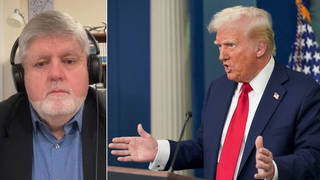
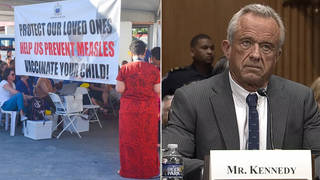
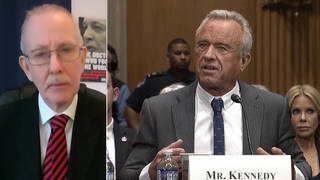
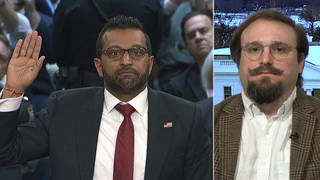





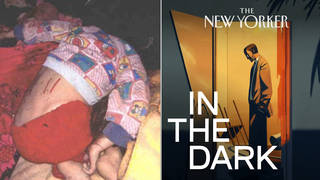
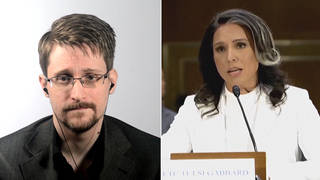
Media Options